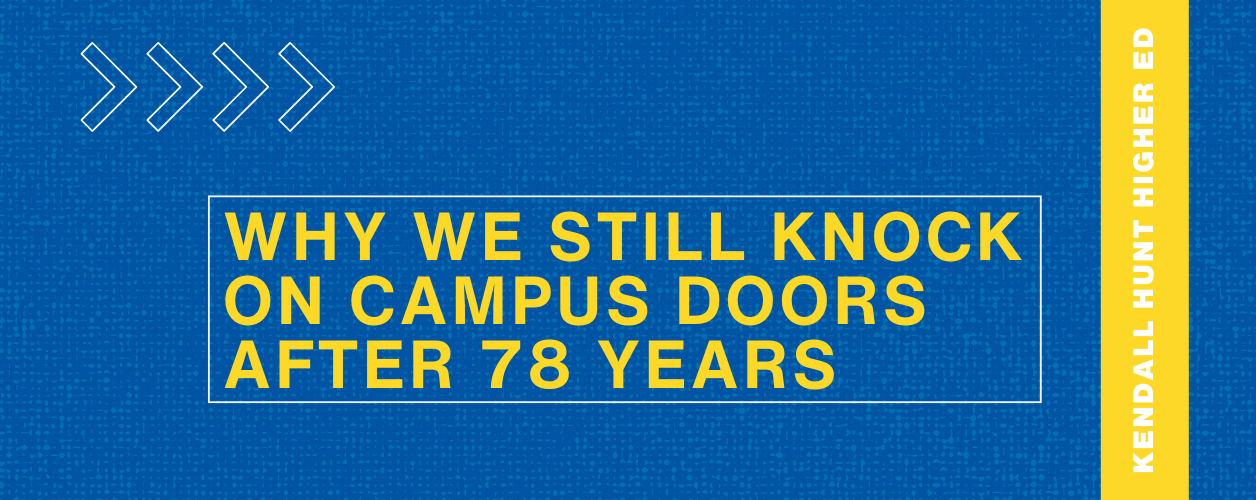
Why We Still Knock on Campus Doors after 78 Years
Campus visits from academic publishers used to be standard practice. Now, relatively few companies send their editors to meet with professors face-to-face. For the most part, virtual meetings have replaced their in-person counterparts.
However, campus visits are still a staple of our publishing model. We’re unpacking why that is, and why it matters for you.
Overcoming Stigma
The first reason we still visit campuses is because it’s a great relationship-builder. It’s humanizing for both parties. And, on the whole, a lack of humanity is what academic publishers are known for.
Academic publishing’s reputation is for making overpriced materials that strain students’ already-stretched funds.
In addition, one-size-fits-all resources don’t always align with course objectives. This means that most of the time, students only use a fraction of the book that they paid for.
That’s not us.
Rather than blindly prescribing course materials, we want to know what your needs actually are. We’ve found that the best way to figure that out is to sit down and have a real conversation.
It’s a non-traditional approach. We’re okay with that.
Personalization
Once we know what your needs are, then we can start problem-solving.
How do your students learn best? What would free you to focus on teaching, rather than the manual labor of compiling course materials? What solution would be effective and affordable?
You really can break away from the barriers keeping you from optimizing your course. Discovering that is electric. Virtual meetings have their place, but they don’t compare to having these conversations in person.
Elephant in the Room
Real talk: textbook costs.
We’re a publisher. We make textbooks. We stay in business by selling textbooks.
So how are we different from traditional academic publishers?
Rather than getting something that’s of little real use, we would much rather students purchase materials that their professor knows will create value–for half the typical price.
Many of our editors have put children through college themselves. They know the frustration of spending $1000 on books that may not even be opened. The consensus: they’re not fans.
The better we understand your course and students, the better we can help create solutions that make the most of their educational investment.
It’s Standard NOT to be Standard
From buying a car to ordering coffee, we live in a world ready to customize products to our exact preferences. And yet, many educational materials are just as static as ever.
One of our staple practices is customization. This improves educational quality by creating a circular learning environment. In other words, what students read supports what they hear in lecture. They’re not put in situations where textbook material contradicts what the professor is teaching, leaving them to figure out what to study and what to ignore.
Meeting in person gives us a better understanding of your unique situation. This is vital, because the one-size-fits-all approach to education isn’t cutting it anymore. It’s not just our business practice…it’s the way the landscape is moving.
Massive Time Investment?
If you don’t have the bandwidth to author an entire textbook, you can still reap the benefits of customized materials. We have a library of classroom-tested content you can borrow and blend with original content.
Down the road, you can replace borrowed content with more of your own. Over time, the material in the publication can be fully yours.
No Substitute
Because of the highly-customized, interpersonal nature of our approach, campus visits are not something we can simply abandon. Pragmatically, in-person conversations are the best way to get at the heart of modern educators’ pain points.
More importantly, relationships matter. Meeting with incredible, high-achieving academics has led to life-changing experiences for many editors on our team.
In someone’s office, you see a side of them that a webcam simply can’t capture. We’re proud of our authors’ accomplishments, and many of them become lifelong connections.
The pandemic halted our in-person campus visits for a while, but it also showed how important they truly are.
Next semester, maybe we’ll see you on campus!